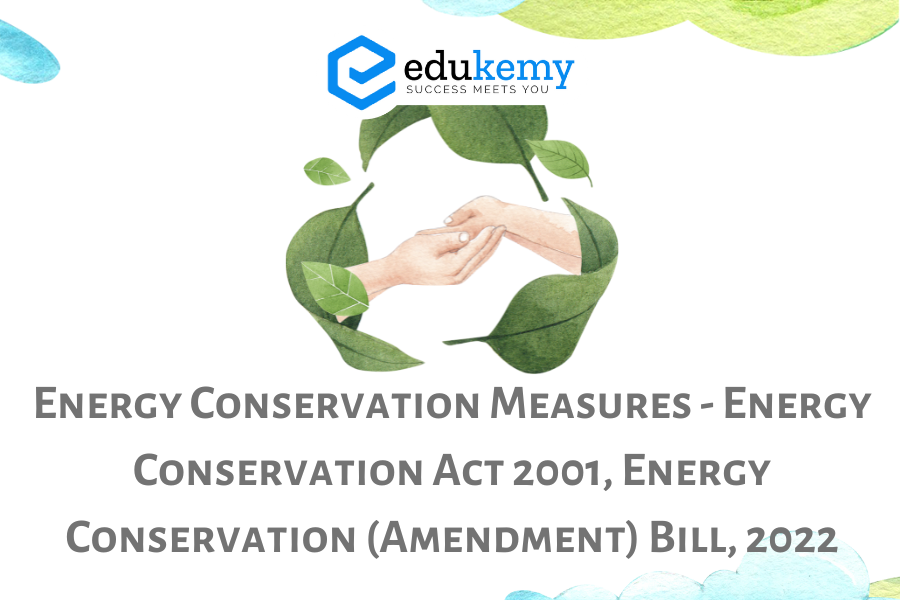- The Energy Conservation Act of 2001 was introduced by the government to establish frameworks aimed at conserving energy.
- According to estimates, energy conservation initiatives have the potential to create a minimum of 25,000 MW of energy.
- To realize this potential, the Indian government enacted the Energy Conservation Act.
- This Act targets energy derived from various sources, including renewable resources, fossil fuels, hydroelectricity, nuclear sources, etc.
- It came into effect on March 1, 2002, and led to the establishment of the Bureau of Energy Efficiency (BEE) to enforce energy conservation efforts. In 2010, the government made an amendment to the Energy Conservation Act.
Contents
Energy Conservation Act 2001 Amendment
- In 2010, the government introduced an amendment to the Energy Conservation Act 2001, altering the time frame for prohibiting the manufacture, sale, or purchase of certain appliances.
- Previously, the government could prohibit such equipment after two years of setting the norms.
- After the Energy Conservation (Amendment) Bill 2010, the government can prohibit such items six months after setting the norms, extendable by another six months.
Energy Conservation Act 2001 Features
- Following the amendment to the Energy Conservation Act 2010, the government gained the power to specify energy consumption criteria for appliances and equipment.
- It can also prohibit the manufacture, sale, purchase, or import of equipment that doesn’t meet the specified criteria.
- Additionally, the time frame for prohibition was reduced from two years to six months.
Energy Conservation Act Significance
- The Energy Conservation Act aims to decrease unnecessary energy consumption in the country.
- With India’s limited proven oil and natural gas reserves and high oil imports, the Act becomes crucial for energy security and economic stability.
- By focusing on improving energy efficiency, the Act seeks to lower the country’s overall energy intensity.
Energy Conservation Act 2001: Objectives
- The primary objective of the Energy Conservation Act is energy conservation. It aims to promote an environmentally responsible lifestyle by providing energy savings, cost reductions, and environmental benefits.
- The Act has several objectives, including providing policy recommendations for national power conservation programs, creating awareness about energy efficiency, and tracking progress through the Bureau of Energy Efficiency (BEE).
Regulations under the Energy Conservation Act 2001
- To achieve the Act’s goals, the government established certain authorities for regulation.
- These include the Bureau of Energy Efficiency, Central Energy Conservation Funds, and Standards & Labeling programs.
- These entities are responsible for implementing energy-related policies, promoting energy efficiency services, and setting minimum energy consumption standards for appliances and equipment.
ENERGY CONSERVATION (AMENDMENT) BILL 2022
- Energy conservation is crucial due to the finite nature of our energy resources.
- The Energy Conservation Act empowers the central government to set energy consumption standards and mandates for designated consumers to utilize a minimum share of energy from non-fossil sources.
- These consumers include industries like mining, steel, cement, textiles, chemicals, petrochemicals, the transportation sector including Railways, and commercial buildings.
- The Act also introduces provisions for carbon trading, allowing the government to establish a carbon credit trading scheme.
- Carbon credits are tradable permits permitting a specified amount of carbon emissions.
- Entities complying with the scheme can receive carbon credit certificates, which can be bought or sold.
- Additionally, individuals or entities can voluntarily purchase carbon credit certificates.
- Another aspect covered by the Act is the establishment of an energy conservation code for buildings.
- The Bill proposes an ‘energy conservation and sustainable building code,’ which sets norms for energy efficiency, renewable energy use, and green building requirements.
- The code applies not only to commercial buildings but also to office and residential buildings meeting specified criteria.
- Expanding its scope, the Act now includes standards for vehicles and vessels, alongside equipment and appliances consuming, generating, transmitting, or supplying energy.
- Vehicles defined under the Motor Vehicles Act, 1988, and vessels, including ships and boats, are now covered under these standards.
- Furthermore, the Bill enhances the regulatory powers of State Electricity Regulatory Commissions (SERCs). Alongside adjudging penalties, SERCs are authorized to formulate regulations to fulfill their functions effectively.
- These measures collectively aim to promote energy conservation, encourage the use of renewable energy sources, and ensure efficient energy consumption across various sectors.
FAQs Related to the Energy Conservation Act 2001
1. What is the Energy Conservation Act 2001?
A: The Energy Conservation Act 2001 is legislation enacted by the Indian government to establish frameworks aimed at conserving energy resources in the country.
2. When did the Energy Conservation Act come into effect?
A: The Energy Conservation Act came into effect on March 1, 2002.
3. What is the purpose of the Energy Conservation Act?
A: The primary purpose of the Energy Conservation Act is to decrease unnecessary energy consumption in the country and promote an environmentally responsible lifestyle. It aims to achieve this by providing energy savings, cost reductions, and environmental benefits.
4. What are the objectives of the Energy Conservation Act 2001?
A: The objectives of the Energy Conservation Act include providing policy recommendations for national power conservation programs, creating awareness about energy efficiency, and tracking progress through the Bureau of Energy Efficiency (BEE).
5. What amendments were made to the Energy Conservation Act?
A: In 2010, an amendment was made to the Energy Conservation Act, altering the time frame for prohibiting the manufacture, sale, or purchase of certain appliances. This amendment reduced the time frame from two years to six months.
In case you still have your doubts, contact us on 9811333901.
For UPSC Prelims Resources, Click here
For Daily Updates and Study Material:
Join our Telegram Channel – Edukemy for IAS
- 1. Learn through Videos – here
- 2. Be Exam Ready by Practicing Daily MCQs – here
- 3. Daily Newsletter – Get all your Current Affairs Covered – here
- 4. Mains Answer Writing Practice – here

